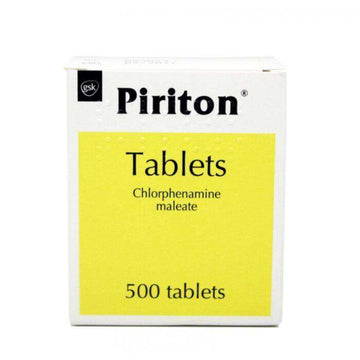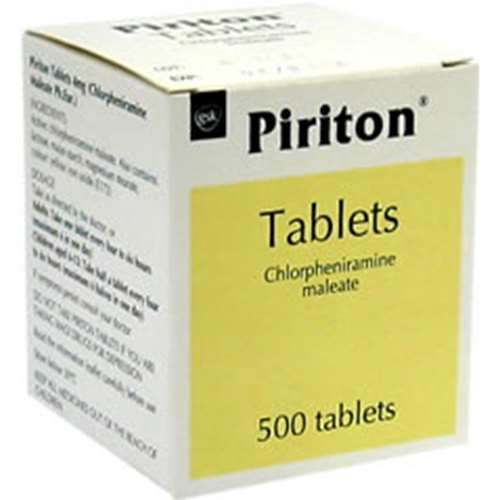Piriton is a trusted antihistamine that helps provide relief from a range of allergy symptoms such as sneezing, runny nose, itchy eyes, and skin rashes. Available in tablets and syrup form, Piriton is designed to be effective yet gentle enough to help manage your allergy symptoms, whether you're dealing with seasonal hayfever, pet allergies, or dust allergies. At Welzo, we offer Piriton at competitive prices, ensuring you have access to reliable and fast-acting relief when you need it most. Explore our full range of allergy and hayfever medication for comprehensive allergy solutions.
Why Choose Piriton for Allergy Relief?
Piriton works by blocking histamine, the substance that triggers allergic reactions in the body. Whether you're suffering from hayfever, pet dander, or dust, Piriton effectively relieves common symptoms, helping you get back to your day with minimal disruption. With its fast-acting formula, Piriton provides effective relief and is ideal for both adults and children who need allergy relief.
Piriton Benefits:
-
Fast Relief: Starts working quickly to reduce sneezing, itching, and congestion.
-
Effective: Proven to reduce allergy symptoms from hayfever, dust, pets, and more.
-
Available for All Ages: With both adult and children’s formulations available, Piriton is safe and gentle for the whole family.
Piriton Variants Available at Welzo
At Welzo, we provide a variety of Piriton options to suit your needs:
-
Piriton Tablets: Convenient for on-the-go relief, these tablets are easy to swallow and perfect for fast, effective relief from allergic symptoms.
-
Piriton Syrup: Ideal for children or those who prefer liquid formulations, Piriton Syrup provides easy-to-administer allergy relief.
Complementary Allergy Relief Products
Pair your Piriton with other effective products to manage your allergy symptoms more comprehensively. We offer a wide range of allergy relief solutions to ensure you're fully prepared for the allergy season:
-
Benadryl: Another trusted antihistamine for relief from various allergy symptoms.
-
Pirinase Nasal Spray: Targeted nasal spray that helps relieve nasal congestion, sneezing, and runny nose caused by allergies.
-
Allergy Eye Drops: Soothe irritated eyes caused by pollen, dust, and pet dander.
-
Children’s Allergy & Hay Fever: Safe, gentle allergy relief products specifically formulated for kids.
For helpful tips and expert advice on managing allergies, be sure to check out our Allergy Blog.
Why Shop Piriton at Welzo?
When you buy Piriton from Welzo, you can expect:
-
Quality and Reliability: Trusted by millions to provide fast, effective relief from allergy symptoms.
-
Convenient Options: With both tablet and syrup forms available, you can choose the best option for your needs.
-
Fast Delivery: Enjoy quick shipping to get your Piriton and other allergy products delivered directly to your door.
-
Competitive Prices: We offer great prices on all our products to ensure you get effective relief without overspending.
-
Expert Advice: Our team is available to help guide you in selecting the right allergy relief products for your needs.
Frequently Asked Questions
What do you use Piriton for?
Is Piriton a good sleeping pill?
Are Piriton and Piriteze the same thing?
How quickly does Piriton work?
- Choosing a selection results in a full page refresh.
- Opens in a new window.





